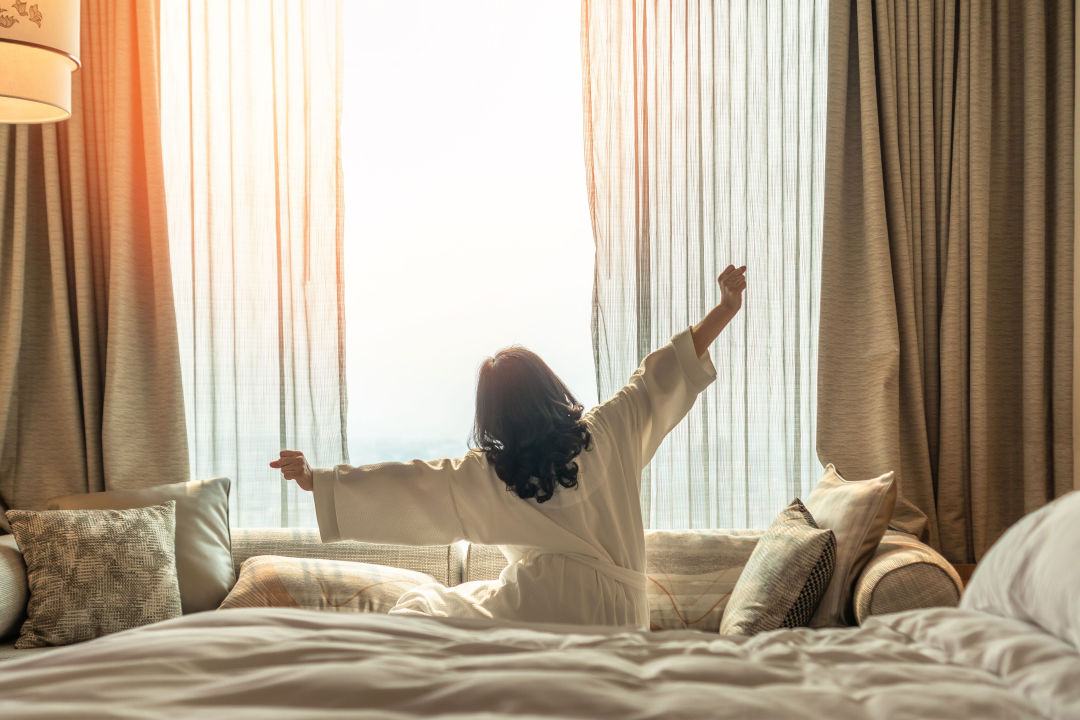Five Tips for Improving Your Sleep Hygiene
The topic of this story was provided by our review partner, Originated Media; SagaCity Media has editorial oversight over specific content.

More than a third of Harris Country residents aren't getting enough sleep, according to the Centers for Disease Control. And, nationally the average number of hours Americans are sleeping each night is on the decline.
These trends have more serious implications than just morning grogginess and snoozing the alarm. Many studies suggest that poor sleep and sleep disorders, like insomnia, can have serious implications, including a heightened risk of cardiovascular disease, obesity, depression, cancer, and other complications.
The CDC recommends that adults get seven hours of sleep each day. One way to help yourself reach that goal, or improve the quality of sleep that you're getting each night, is by practicing good sleep hygiene—aka the set of behaviors or environmental practices to improve sleep.
Here are a few science-backed pointers for how to practice good sleep hygiene and catch quality Z's.
Consistency Is Key
Allow your body to get into a daily sleep rhythm by following a somewhat consistent schedule each day, even on the weekends. The CDC and the American Academy of Sleep Medicine recommend waking up at the same time each day to achieve better sleep hygiene at night. Carrying that consistency through the rest of your day can also help lead to better sleep. Daily exercise and regular meal times promote healthy sleep habits, various sources say. And even having a consistent bedtime routine that's as simple as brushing your teeth and putting on pajamas each night can help signal to your body that it's time for sleep, which helps you fall asleep and stay asleep, according to the Sleep Foundation.
The Morning Matters
Breakfast may actually be the most important meal of the day when it comes to sleep. While it might feel counterintuitive, studies show that the morning meal leads to better sleep at night. According to an overview of nearly 150 studies on sleep, the omission of breakfast has been tied to poor sleep the next night.
Early birds who exercise in the morning were also shown to have fewer wakings in the second half of the night, according to a 2017 clinical trial. Additionally, a separate study showed that those who got direct sunlight between 8 and 10 a.m. had better sleep quality.
Consider Nutrition
What we eat plays a role in how we sleep. Studies show, and many people intuitively know, that avoiding sweets, sugary drinks ,and caffeine before bed can boost sleep quality. Excessive calorie intake or late-night meals can also interfere with sleep; and fried foods have been tied to more wakings at night.
But there are also foods that boost sleep by allowing the body to better regulate serotonin. Fish with more than five percent fat, such as salmon, mackerel, and trout, has been shown to improve sleep. Studies have also shown that too little or too much protein in one’s diet can negatively impact sleep.
Moderate the Stimulants
Stimulants are often used to evade grogginess in the daytime or induce sleepiness in the evening. But studies show these are quick fixes that can lead to a cycle of poor sleep. For instance, the effects of caffeine may last longer than 10 hours, even up to 20 hours for some, studies say. Thus, numerous sleep and health organizations call for limiting its intake in the afternoon and evenings.
Alcohol meanwhile might help imbibers fall asleep faster, but it leads to more disruptions later in the night, according to the Sleep Foundation. The foundation recommends moderating alcohol consumption and avoiding it later in the evening as studies show it can impair sleep when consumed up to six hours before bedtime. Cannabis follows similar trends and has been shown to lead to long-term sleep disorders. Smokers also have a higher risk of sleep disorders, poor sleep quality, and daytime sleepiness.
Set the Mood
Optimize your sleeping environment beyond just a comfy mattress and clean sheets—though they can help. As you're winding down for bed, dim the lights and stay away from bright or blue light from screens, which can reduce the levels of melatonin released in the body to support sleep. The Sleep Foundation also recommends setting the temperature inside your home or bedroom to between 65-68°F, which doctors say is the most comfortable temp for sleep.
And if all this isn't working, take a break from trying to sleep. If you are still awake after 20 minutes of tossing and turning, the foundation recommends getting out of bed and doing something calming, like reading or stretching, before trying to sleep again.
Everyone's specific sleep hygiene needs are different, but testing out a few of these methods can help lead to better rest and sound sleep. Still, those dealing with ongoing or severe sleep disorders should contact a medical professional for help.
